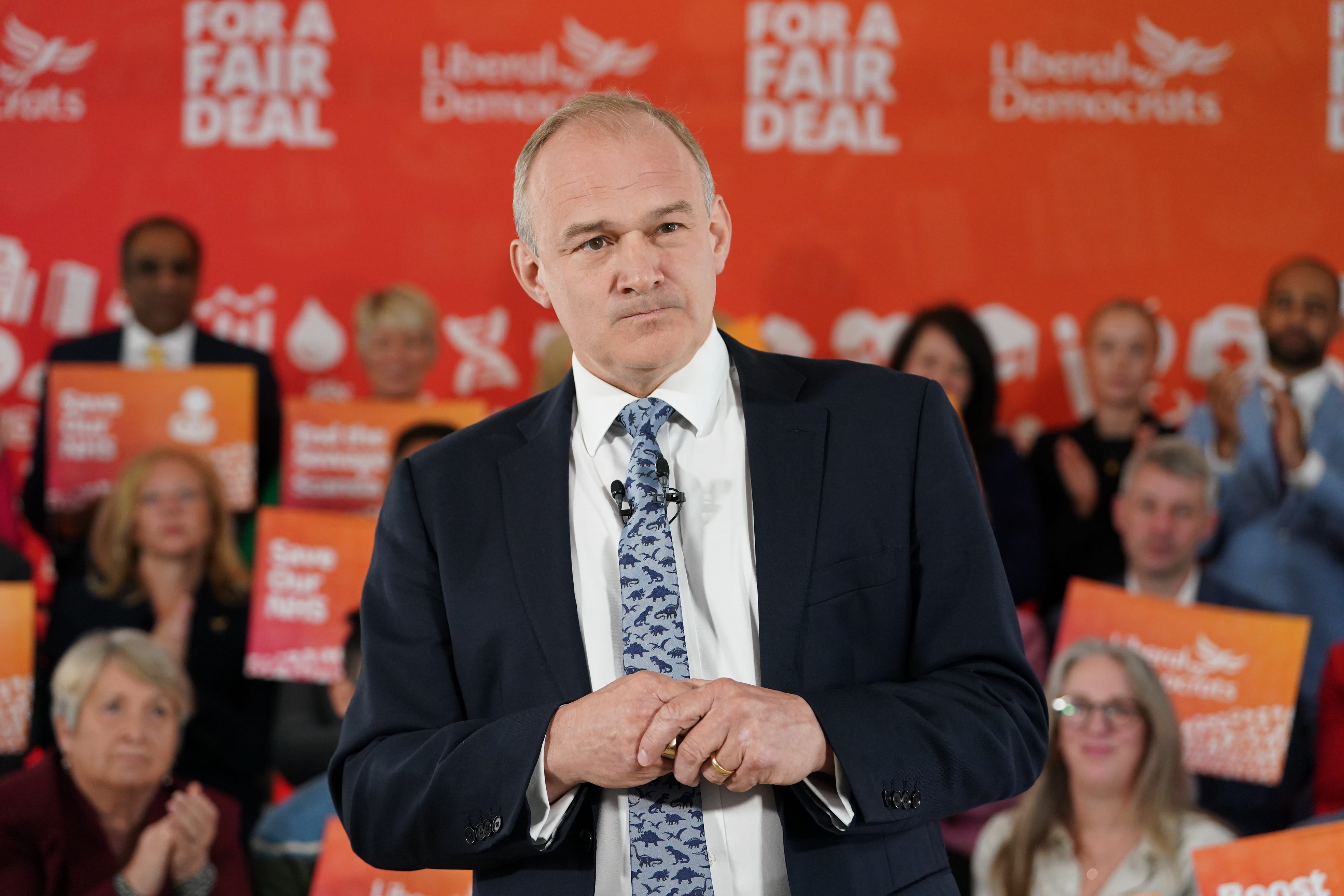The Independent's journalism is supported by our readers. When you purchase through links on our site, we may earn commission.
Who’d have thought ‘stuntman’ Ed Davey could be the next leader of the opposition?
The Liberal Democrats have made a splash during the election campaign – as their leader has played his photo ops for laughs. But maybe it’s time to take them seriously, writes John Rentoul


Ed Davey once jumped off the platform at Clapham Junction to rescue a woman who had fallen onto the tracks. Ever since I heard that story, I have thought of him as someone with hidden qualities. He looks after his disabled son. He lent Ed Balls his O-level history notes when he was in the year above at Nottingham High School.
And now he is being talked about seriously as the possible leader of the opposition in the next parliament.
It is a surprising turn for someone who has hardly been noticed as leader of the UK’s fourth party since he took over four years ago. In a recent video of people being stopped in the street and asked if they could identify party leaders, the most common response was a shake of the head: “I can’t help you with the last one, sorry.”
At the last election, the Liberal Democrats were reduced from 12 seats to 11, with Jo Swinson, the leader, losing her seat in Scotland. Since the 4 July election was called, MRP polls have suggested the Lib Dems are on course to win between 30 and 67 seats.
That 67-seat projection, from YouGov, which has a good record of MRP modelling, would exceed the peak of Lib Dem representation – 62 seats in the 2005 election under Charles Kennedy’s leadership.
And, set against other MRP projections that put the Conservatives on as few as 53 seats – with two weeks of a disastrous campaign to go – it raises the extraordinary possibility that the Lib Dems could be the second largest party in the new parliament, and that Davey could therefore be leader of the official opposition.
They would be a strange opposition, given how close their policies are to Labour’s, and that neither Davey nor Keir Starmer has ruled out a pact between the two parties.
Even if he ends up with fewer seats than the Tories, he is very likely to lead the third largest party in the Commons, as the Scottish National Party is projected, on average, to win only 22 seats. That means he would get the guaranteed two goes at Prime Minister’s Questions previously enjoyed by Stephen Flynn, the SNP Westminster leader.
How has he done it?
He has infuriated many of his own members, and puzzled many commentators, including me, by his refusal to position the Lib Dems as the party of rejoining the EU. Instead of this distinctive stance, enthusiastically supported by more voters than intend to vote Lib Dem, the party’s policies have been a bland posset of earnest but forgettable slogans about sewage, social care and children’s mental health.
I realised early on in this parliament what he was up to. Not only was he scarred by Jo Swinson’s foolish policy at the last election of revoking Brexit without a further referendum, he was positioning the party as the inoffensive receptacle for protest votes, especially in Tory areas with significant Leave-voting electorates.
It was a brilliantly successful strategy for fighting by-elections, but it was also an astute plan for a general election, giving the Lib Dems the chance to pick up Tory seats across the south of England in places where they came second last time.
Davey can hardly have imagined that Rishi Sunak’s poor campaign and the irruption of Nigel Farage would cause Tory support to drop so low, but he was well placed to take advantage of it. As the Tory sea level sinks, it exposes hidden peak after hidden peak of new Lib Dem strongholds.
Concealed by the rise of Reform and the noisy distraction of Nigel Farage, the Lib Dems have been the other big winners of this election campaign. Their support has risen in the opinion polls – mostly thanks to Labour tactical voters realising that they are best placed to defeat the local Tory candidate, and helped by a clever campaign of falling off paddle boards and riding rollercoasters, in which Davey has got himself noticed and appeared to enjoy himself.
Davey did well on BBC Question Time last night, coming across as contrite and reasonable about his time as Post Office minister, having learned his lesson about the tuition fee betrayal of the coalition years – he lost his seat in 2015 and won it back in 2017 – and proud of his wife Emily, who is chair of housing on Kingston Council, which he claimed has the biggest social housing programme in the country.
But who would have thought at the start of this campaign that we would be taking Ed Davey, the self-effacing British hero, seriously as the possible next leader of the opposition?






Join our commenting forum
Join thought-provoking conversations, follow other Independent readers and see their replies
Comments